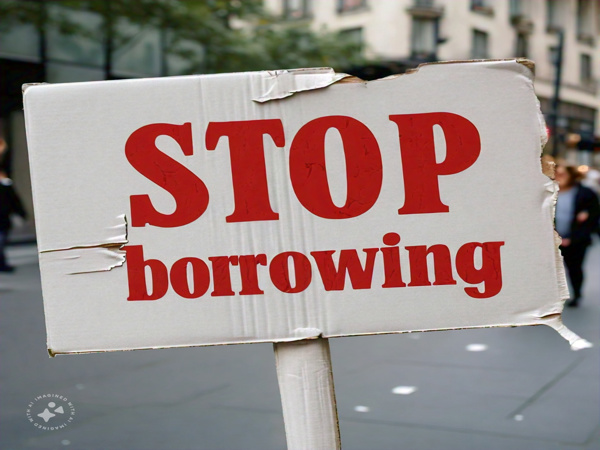In the fast-paced world we live in today, financial decisions can often feel like a race against time. Emergencies arise, and the need for quick cash can make loan apps seem like a convenient solution. However, this convenience comes at a steep cost, and it's crucial to understand why you must stop borrowing from loan apps, especially those that offer 30-day and 7-day loans. The financial consequences of relying on these apps are severe, and if not carefully managed, they can lead to a never-ending cycle of debt that could ruin your financial health.
The Reality of 30-Day Loan Apps
Loan apps offering 30-day repayment terms might initially seem manageable. You borrow a sum of money, and you're given a month to repay it. But here’s the catch: the interest rates are exorbitant. At 40% per month, borrowing ?100,000 means that by the end of one year, you will have paid 480% in interest alone. Let that sink in—480%!
Example:
- Amount borrowed: N100,000
- Monthly interest rate: 40%
- Interest paid after one year: N480,000
Imagine what that kind of interest could do to your finances. You're essentially handing over almost five times the amount you borrowed in interest payments alone. This isn't just a financial burden; it's a financial trap. The more you borrow, the deeper you sink into debt, making it increasingly difficult to break free. This vicious cycle is designed to keep you hooked, ensuring that you continue to pay exorbitant interest rates, month after month, without ever really reducing your debt.
The Perils of 7-Day Loan Apps
If you think 30-day loans are bad, 7-day loans are even worse. These apps are designed for ultra-short-term borrowing, with interest rates that are nothing short of predatory. At 40% per week, a N100,000 loan can spiral into an astronomical amount over a year. The numbers are staggering.
Example:
- Amount borrowed: N100,000
- Weekly interest rate: 40%
- Interest paid after one year: N1,920,000
Yes, you read that right. By the end of one year, you will have paid almost twenty times the amount you initially borrowed in interest. The interest rates on these loans are designed to be so crippling that they leave borrowers in a perpetual state of financial distress. The moment you miss a payment or default, these apps often resort to extreme measures to recover their money. They may start tarnishing your image, contacting your friends and family, or even resorting to public shaming.
The Bigger Picture: Why the Poor Remain Poor
These loan apps exploit the financially vulnerable, trapping them in cycles of debt that are nearly impossible to escape. The argument that "Nigeria owes trillions of dollars, so why shouldn't I borrow?" is a dangerous mindset. What many people don't realize is that national debt operates on an entirely different scale. The interest rates on government loans are often less than 5% per year, and bank loans usually have interest rates of less than 15% per year. This is a far cry from the 40% per month or per week that loan apps charge.
Borrowing from loan apps is not a viable financial strategy. It's a quick fix that leads to long-term pain. The business model of these apps is set up to exploit your financial needs, not to help you succeed. They thrive on your desperation, encouraging you to borrow more and more until you're drowning in debt. This isn't just a financial issue; it's a social issue. The poor remain poor because they are continually exploited by systems that are designed to keep them in poverty.
The Psychological Toll
Beyond the financial implications, there's a psychological toll to consider. Constantly worrying about loan repayments, receiving threatening messages from loan app representatives, and dealing with the stigma of being in debt can take a severe toll on your mental health. The stress and anxiety of being trapped in a cycle of debt can affect every aspect of your life, from your relationships to your work performance. The short-term relief that loan apps provide is not worth the long-term damage to your well-being.
Breaking Free: What You Can Do
It's not easy to break free from the clutches of loan apps, but it's not impossible either. Here are some steps you can take to regain control of your financial life:
Stop Borrowing: The first and most crucial step is to stop borrowing from loan apps. It might be difficult at first, but it's essential to break the cycle of debt.
Create a Budget: Take a hard look at your income and expenses. Create a realistic budget that allows you to live within your means without resorting to borrowing.
Seek Financial Advice: If you're struggling to manage your finances, seek advice from a financial advisor or a trusted mentor. They can help you create a plan to pay off your debt and build a more secure financial future.
Explore Other Options: There are often other ways to manage financial emergencies that don't involve borrowing from loan apps. Consider options like borrowing from friends or family, selling unused items, or taking on a part-time job to generate extra income.
Educate Yourself: Financial literacy is key to avoiding debt traps. Educate yourself about the dangers of high-interest loans and the importance of saving and investing.
Conclusion
Borrowing from loan apps may seem like a quick solution to financial problems, but in reality, it's a path to financial ruin. The interest rates are designed to be crippling, and the business model is built on keeping you in debt. The sooner you stop borrowing from these apps, the sooner you can start rebuilding your financial life. Remember, no loan app will ever make you wealthy. The key to financial success lies in making informed decisions, living within your means, and seeking out sustainable financial solutions.

.jpg)








